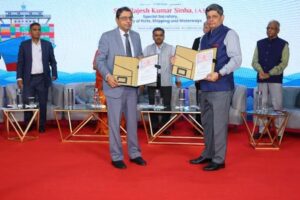Mastering multimodal logistics demands technical expertise, route optimisation, effective communication, and regulatory compliance. Explore essential skills for success in this industry and gain insights into what it takes to excel.

Effective communication is vital in multimodal logistics, which relies on collaboration
Navigating the world of logistics involves orchestrating the transport of goods across great distances. Multimodal logistics, which integrates various transportation modes such as road, rail, air, and sea, is crucial to the global supply chain. To thrive in this complex field, certain key skills are essential. Industry experts Kamal Jain, Director, Cargomen Logistics, and Apeksha Gupta, Head of Skilling at VCJ Foundation, offer insights into the skills required for success.
Foundation for smooth operations
Technical expertise is fundamental for managing multimodal logistics effectively. Kamal Jain highlights the importance of mastering Transportation Management Systems (TMS), which help professionals plan, execute, and optimize transportation across different modes. This ensures efficient coordination of logistics activities. Additionally, Apeksha Gupta emphasises the need to understand Warehouse Management Systems (WMS), which integrate inventory management with transportation processes, ensuring seamless operations.
Beyond maps and schedules

Route planning is critical for cost-effective and timely deliveries. Logistics professionals must stay informed about factors such as flight schedules, ship calls, and port operations to create optimal routes. Modern tools, like specialized route optimization platforms, are essential for this task. Kamal Jain advises leveraging these digital tools to enhance route optimization skills. Gaining insights from experienced professionals can further improve proficiency and reduce errors.
Building bridges for success
Effective communication is vital in multimodal logistics, which relies on collaboration. Apeksha Gupta underscores the need for clear and concise communication to facilitate the exchange of information among various stakeholders. Active listening and understanding instructions from shippers and consignees are crucial. Strong negotiation skills also contribute to smoother operations. Moreover, cultural sensitivity is important for respectful and effective communication across different regions.
Staying compliant
The logistics sector is subject to constantly changing regulations. Keeping up with the latest compliance standards is essential. Resources like Taxman, Taxindiaonline, Lawcrux, DGCA (aviation), the Ministry of Shipping, and the Ministry of Surface Transport provide valuable information for staying current with regulatory changes. Engaging in industry events and webinars can also help professionals stay informed.
Understanding the symphony
A well-integrated supply chain is the cornerstone of effective multimodal logistics. Training programs featuring real-time case studies can deepen understanding of complex scenarios, as noted by Apeksha Gupta. Cross-functional training helps individuals appreciate various roles within the supply chain, improving movement planning. Continuous learning through industry resources, practical training, and advanced certifications in supply chain management with a focus on integration equips professionals for success.
The evolving skillset
Multimodal logistics is a rapidly evolving field, requiring ongoing learning. Staying updated on technological advancements, such as automation, AI, and blockchain, is crucial. Additionally, understanding sustainability practices is increasingly important. Professionals who can optimise routes to reduce emissions and integrate eco-friendly practices will be well-positioned for future success.
Mastering these skills and remaining adaptable will make professionals valuable assets in multimodal logistics, ensuring efficient global goods movement and contributing significantly to the supply chain.











